The Biology of Blubber
By Dr. Mehmet Oz
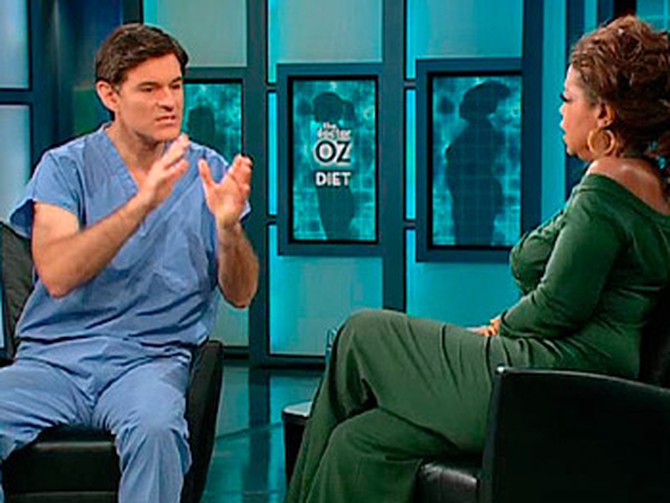
Dr. Mehmet Oz and Dr. Michael Roizen have answered your most embarrassing health questions and taken you inside the human body.. Now they're here to help you with your "waist management."
In their new book, YOU: On a Diet, Dr. Oz and Dr. Roizen explain the science behind lasting weight loss. "This is an operating system for understanding how your body works in the world around it," Dr. Oz says. "There are things we know biologically that have to happen for a diet to work for you."
Dr. Oz says one of the biggest mistakes dieters make is to dramatically decrease their calorie intake. Instead, Dr. Oz and Dr. Roizen say you should only cut your calories by 100 a day.
In their new book, YOU: On a Diet, Dr. Oz and Dr. Roizen explain the science behind lasting weight loss. "This is an operating system for understanding how your body works in the world around it," Dr. Oz says. "There are things we know biologically that have to happen for a diet to work for you."
Dr. Oz says one of the biggest mistakes dieters make is to dramatically decrease their calorie intake. Instead, Dr. Oz and Dr. Roizen say you should only cut your calories by 100 a day.
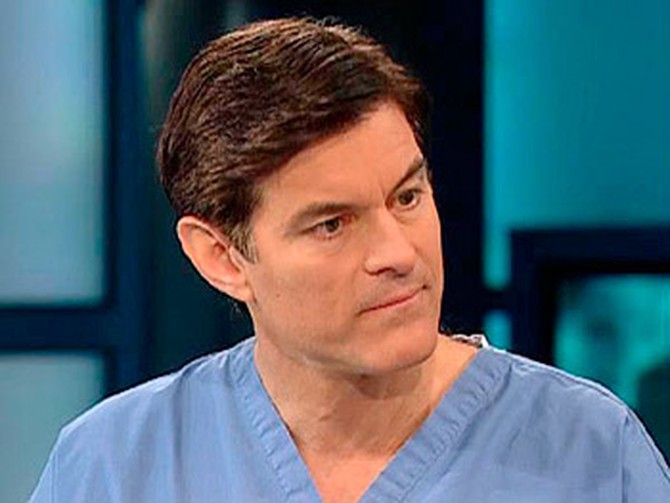
Stepping on a scale is the primary way that people measure the success of their diet, Dr. Oz says, "because it's easy to do. But it's actually misleading in many ways."
For one thing, muscle weighs more than fat. By turning fat to muscle, you'll weigh more even though you'll be healthier. Also, weight doesn't tell you where the fat is. Fat around your legs and thighs is relatively harmless, but fat around your waist can lead to serious medical problems.
Instead of focusing on the number on the scale, Dr. Oz says to focus on the number around your waist. The ideal waistline for women is 32 and a half inches and 35 inches for a man—a goal that is achievable by everyone, no matter your age, Dr. Oz says. In the Oprah Show audience 47 percent of women and 93 percent of men were over the ideal waist size.
"Mike and I are doctors," Dr. Oz says. "I want you guys to look beautiful out there...but I want you to be alive to enjoy it. And that's what this is all about."
For one thing, muscle weighs more than fat. By turning fat to muscle, you'll weigh more even though you'll be healthier. Also, weight doesn't tell you where the fat is. Fat around your legs and thighs is relatively harmless, but fat around your waist can lead to serious medical problems.
Instead of focusing on the number on the scale, Dr. Oz says to focus on the number around your waist. The ideal waistline for women is 32 and a half inches and 35 inches for a man—a goal that is achievable by everyone, no matter your age, Dr. Oz says. In the Oprah Show audience 47 percent of women and 93 percent of men were over the ideal waist size.
"Mike and I are doctors," Dr. Oz says. "I want you guys to look beautiful out there...but I want you to be alive to enjoy it. And that's what this is all about."
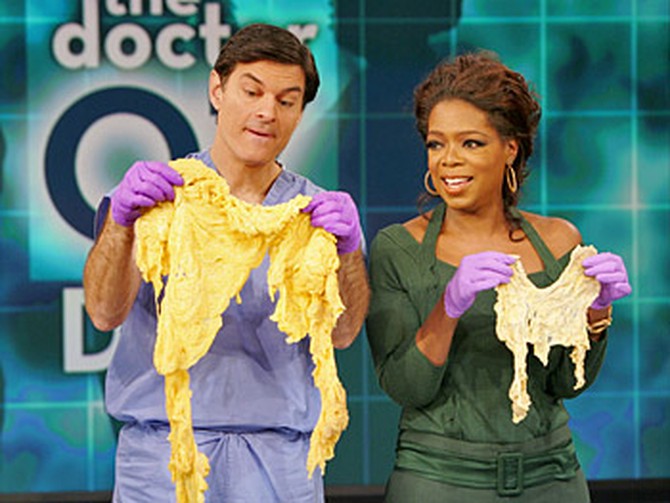
Dr. Oz says there's an organ inside all of us that plays a key role in making us fat—the omentum. "This organ literally pumps chemicals into your body and it holds the secrets ... to los[ing] weight."
The omentum is the fat organ connected to your stomach that's only purpose is to catch and store fat. When the fat is stored in your stomach, your body has easy access to it. The fat then creates an inflammatory process that irritates your arteries and puts you at risk for blocked arteries.
A healthy omentum, like the one Oprah's holding, should be "lacy, like stockings," Dr. Oz says. "The omentum, you'll notice, is transparent and thin."
An unhealthy omentum, like the one Dr. Oz holds, is heavy with fat. While the omentum he's holding is thick and fatty, Dr. Oz says the person it once belonged to—who died of heart disease—was just 30 to 40 pounds overweight.
"When someone's beer bellied, you know how it gets that tense, big look? That's this," he says. "That's [the omentum] pushing up against your stomach, and it coils up in there."
The omentum is the fat organ connected to your stomach that's only purpose is to catch and store fat. When the fat is stored in your stomach, your body has easy access to it. The fat then creates an inflammatory process that irritates your arteries and puts you at risk for blocked arteries.
A healthy omentum, like the one Oprah's holding, should be "lacy, like stockings," Dr. Oz says. "The omentum, you'll notice, is transparent and thin."
An unhealthy omentum, like the one Dr. Oz holds, is heavy with fat. While the omentum he's holding is thick and fatty, Dr. Oz says the person it once belonged to—who died of heart disease—was just 30 to 40 pounds overweight.
"When someone's beer bellied, you know how it gets that tense, big look? That's this," he says. "That's [the omentum] pushing up against your stomach, and it coils up in there."
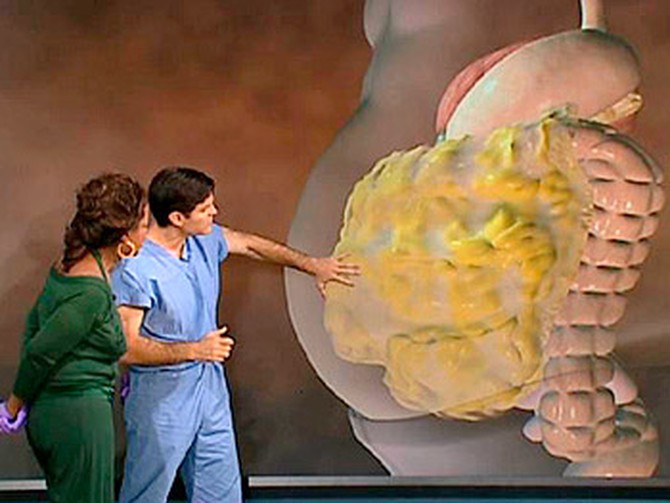
Ever wonder how food turns to fat in your body? Dr. Oz describes the long journey!
Food in the stomach is first pushed slowly past the stomach lining into the small bowel. There the food is mixed, like soap, with bile. "It washes the fat," Dr. Oz explains. "It makes it so you can absorb it. As that bile mixes with the food that you've taken in, it begins to get absorbed across the wall. As it gets absorbed, if it's healthy oils, for example, it makes your liver very happy. But if this is full of trans fats and hydrogenated fats and foods that aren't good for you, it's very toxic to the liver."
In the picture above you can see the liver has turned from rich red to white, signaling an unhealthy, fatty liver. You can also see an expanding omentum, leaving a big belly.
Next food moves through the small intestine and into the large bowel. A valve between the two can slow this movement. "That [valve] is stimulated by fiber," Dr. Oz says. "The reason people who have breakfast lose weight is because they have fiber in their diet. Food doesn't come through quite as quickly so you don't feel hungry as quickly."
Fiber—from foods like whole grains and fruit—makes you need fewer calories in your meal while still making you feel full.
Food in the stomach is first pushed slowly past the stomach lining into the small bowel. There the food is mixed, like soap, with bile. "It washes the fat," Dr. Oz explains. "It makes it so you can absorb it. As that bile mixes with the food that you've taken in, it begins to get absorbed across the wall. As it gets absorbed, if it's healthy oils, for example, it makes your liver very happy. But if this is full of trans fats and hydrogenated fats and foods that aren't good for you, it's very toxic to the liver."
In the picture above you can see the liver has turned from rich red to white, signaling an unhealthy, fatty liver. You can also see an expanding omentum, leaving a big belly.
Next food moves through the small intestine and into the large bowel. A valve between the two can slow this movement. "That [valve] is stimulated by fiber," Dr. Oz says. "The reason people who have breakfast lose weight is because they have fiber in their diet. Food doesn't come through quite as quickly so you don't feel hungry as quickly."
Fiber—from foods like whole grains and fruit—makes you need fewer calories in your meal while still making you feel full.
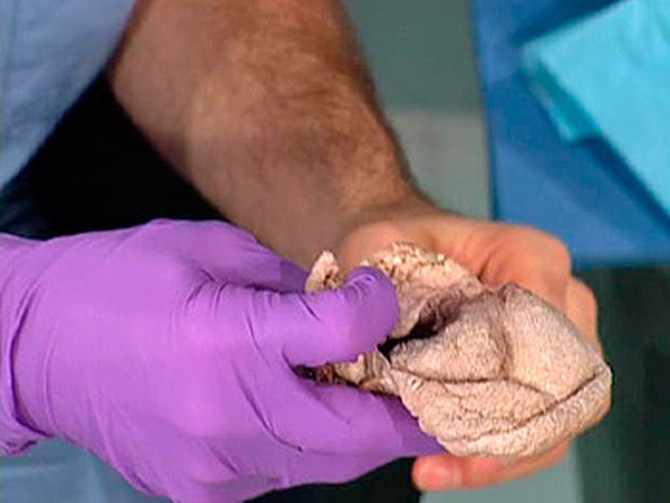
Here's a surprise—the most powerful muscle in your body could be making you fat. Here's another—that muscle is your tongue!
"First of all, the tongue makes us incredibly good at eating," Dr. Oz says. "Human beings don't waste any calories. We put food in our mouth and we get the calories out because the tongue moves the food around a lot and our teeth embed against each other. ... Now, because we're efficient like that, we extract all the calories. Our tongue also tells us what kinds of food to eat."
Dr. Oz says that you can learn a lot about your body by knowing if you're an "undertaster," a "supertaster," or someplace in the middle. To find out which you are, stir a packet of Sweet 'n Low into about four ounces of water. Taste it. Is it sweet or bitter?
"If it tastes bitter it means that saccharin overpowered your taste buds, which means you're a supertaster," he says. "Supertasters don't like vegetables and fruits. They taste too pungent, too strong, for them. They need to take a multivitamin because if you don't like to eat those foods, you need to get that nutrition somewhere else."
"If the mixture tastes sweet, you're an undertaster," Dr. Oz says. "It means that you're going to crave a lot of foods because you can never satisfy your palate."
"Our taste buds behave differently," he says. "About the only thing we can really alter is our craving of fat, which is acquired. The rest of our traits tend to be inherited."
"First of all, the tongue makes us incredibly good at eating," Dr. Oz says. "Human beings don't waste any calories. We put food in our mouth and we get the calories out because the tongue moves the food around a lot and our teeth embed against each other. ... Now, because we're efficient like that, we extract all the calories. Our tongue also tells us what kinds of food to eat."
Dr. Oz says that you can learn a lot about your body by knowing if you're an "undertaster," a "supertaster," or someplace in the middle. To find out which you are, stir a packet of Sweet 'n Low into about four ounces of water. Taste it. Is it sweet or bitter?
"If it tastes bitter it means that saccharin overpowered your taste buds, which means you're a supertaster," he says. "Supertasters don't like vegetables and fruits. They taste too pungent, too strong, for them. They need to take a multivitamin because if you don't like to eat those foods, you need to get that nutrition somewhere else."
"If the mixture tastes sweet, you're an undertaster," Dr. Oz says. "It means that you're going to crave a lot of foods because you can never satisfy your palate."
"Our taste buds behave differently," he says. "About the only thing we can really alter is our craving of fat, which is acquired. The rest of our traits tend to be inherited."
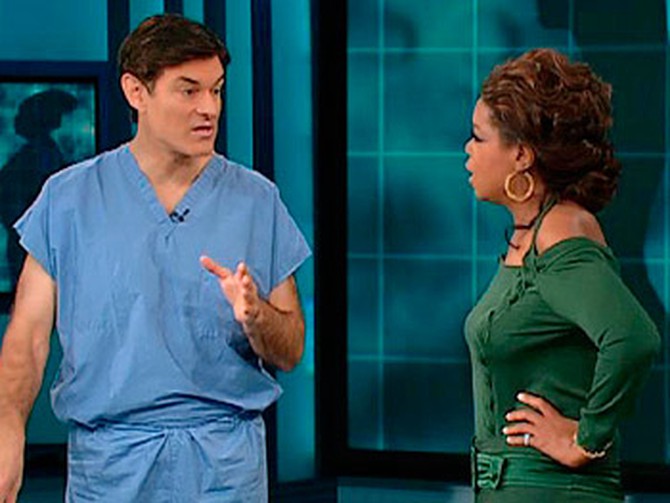
The foods you crave, and when you crave them, might just depend on your mood. "Our bodies are designed to fulfill our needs," Dr. Oz says. "The gut and the brain are the two most closely related organs. So it makes perfect sense that the foods we eat change the way our brains function."
Dr. Oz says the following cravings could mean you are feeling these moods:
And the intersection of food and mood doesn't stop at cravings. It also involves how we can proactively affect our emotions. "If you're depressed, you should take omega-3 fatty acids, especially women who are having babies," Dr. Oz says. "That baby sucks all that healthy fat out of your body and you get depressed after you have this beautiful, brilliant wonderful baby."
Dr. Oz says the following cravings could mean you are feeling these moods:
- Meat could mean you're angry
- Sweets might be a sign of depression
- Ice cream might mean you're anxious
- Salty snacks could mean you're stressed
- Pasta might signal loneliness or sexual frustration
- All of the above might mean you're just a little bit jealous
And the intersection of food and mood doesn't stop at cravings. It also involves how we can proactively affect our emotions. "If you're depressed, you should take omega-3 fatty acids, especially women who are having babies," Dr. Oz says. "That baby sucks all that healthy fat out of your body and you get depressed after you have this beautiful, brilliant wonderful baby."
Published 01/01/2006

